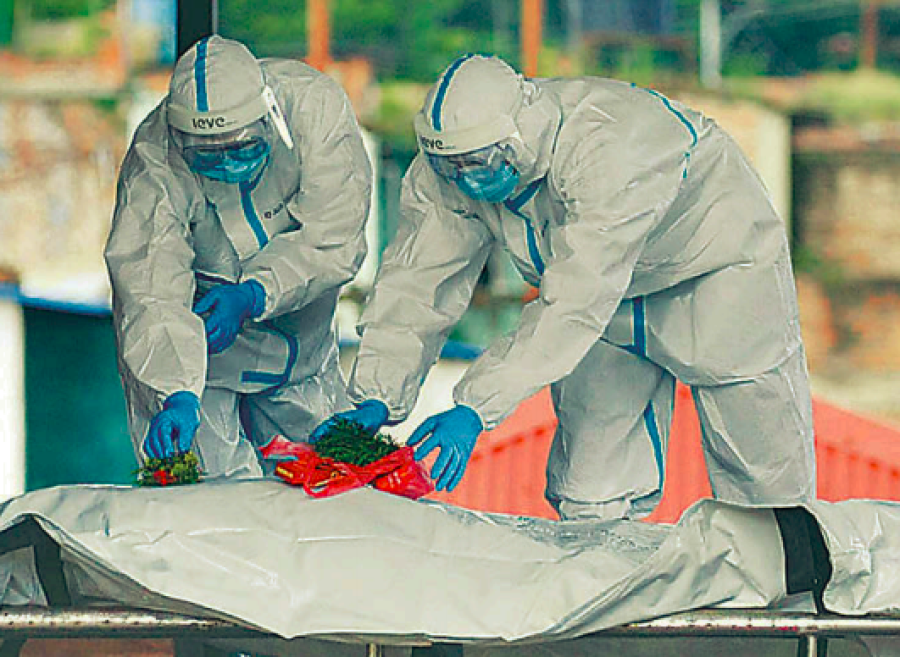Health
With free testing only of symptomatic patients contact tracing is yet to resume
As people are left to die in their homes due to government apathy, officials say that asymptomatic cases, which make up the majority of the infected, may be superspreaders of the virus.
Arjun Poudel
As of Monday, 233,452 people have tested positive for the coronavirus while 1,508 deaths have been reported throughout the country.
But, by implicit admission of officials at the Health Ministry, the figures could be more as contact tracing has effectively stopped since October 17, when the ministry stopped free tests and free treatment for Covid-19 as per the decision of the Cabinet on October 5.
Although the Supreme Court has ordered the government to conduct free tests and treatment, the Health Ministry has not yet resumed contact tracing, a crucial strategy to break the chain of virus transmission.
“How can contact tracing be resumed when the government only conducts tests of symptomatic patients,” a senior official at the Health Ministry said on condition of anonymity. “The government is not serious about containing the infection.”
The government’s October 5 decision has also killed many people who could have been saved otherwise.
Two weeks ago, a 65-year-old man from Goldhunga in Kathmandu was rushed to Tribhuvan University Teaching Hospital in a critical condition. He was admitted to the intensive care unit and later put on a ventilator support.
“The patient died after a few hours,” Dr Niraj Bam, associate professor at the Institute of Medicine, told the Post. “It was only after his death that we found that he had been infected with the coronavirus.”
Family members of the deceased man told the doctors that they rushed him to the hospital after he fainted.
Dr Jageshwor Gautam, spokesperson for the Health Ministry, had asked the general public to go to the hospital only if they feel that they are going to be unconscious and if breathing becomes difficult and complicated.
Similarly, a 62-year-old woman from Kapan in Kathmandu, who died last month in her home, tested positive for the virus only after her death.
According to Bam, her family members regretted not taking her to hospital.
“Government officials have urged the public not to go to a hospital unless it is an emergency,” Bam added. “In these cases, patients were kept at their homes until their conditions became too critical and they eventually lost their lives.”
With the government deciding not to conduct free testing and treatment, people stopped seeking medical care. Isolation centres of hospitals, which used to be full earlier, started to become vacant as the hospitals started forcing the patients to pay.
“The result of the decision to not provide free treatment and tests is before all of us,” said Bam, who is also a senior chest physician at the Tribhuvan University Teaching Hospital. “Patients started seeking services only after they became serious or unconscious. This led to the increase in the fatality rate.”
Of the 1,435 people who died from the Covid-19 until Friday, 855 were aged over 60 years. According to the Health Ministry, most of those people who died from the coronavirus had pre-existing conditions.
“When the government asks the people to go to a hospital only in emergency conditions or only after one feels that one would become unconscious, the fatality rate will rise,” said Dr Sushil Nath Pyakurel, former acting health secretary. “The people and the country have been paying the price for wrong policy decisions. Had we not been told such things, people with pre-existing conditions would have lived.”
Following the Supreme Court refusal to entertain a review petition filed by the Health Ministry over its previous ruling regarding free tests and treatment, the government was forced to resume free polymerase chain reaction testing.
But since the guideline for testing includes only ‘symptomatic’ cases, the number of tests has not increased.
Doctors say that over 70 percent of infected people remain asymptomatic but given the government guideline for testing, they cannot be tested.
According to a Health Ministry official, without testing the people who came in close contact with the infected individuals, the ongoing spread of the coronavirus cannot be contained.
“As there is no cure for the coronavirus infection, the government should treat symptomatic patients and test those who came into contact with the infected even if they are asymptomatic,” the official said, warning that there is a high risk of asymptomatic patients becoming superspreaders.
Former acting health secretary Pyakurel said that the provision of testing only symptomatic patients bars people from their constitutional rights of health care and this is sheer irresponsibility as well as contempt of the court’s order.
“One wrong policy decision always has chain effects,” he added. “The decision to halt free Covid-19 tests and care not only made people suffer but also pushed the country’s achievements in the health sector several years back.”
Instead of being sincere, it seems that the government is intent on finding loopholes in the court’s order so as not to expand testing, and this way the ongoing pandemic cannot be contained, said Pyakurel.
Public health experts had suggested multiple alternatives, including direct polymerase chain reaction tests, to lessen the cost of testing.
But instead of taking the experts’ suggestions positively, the government is busy finding loopholes like testing only those who are symptomatic and not contact tracing.
“This government is making a serious blunder,” Dr Dirgha Singh Bam, former health secretary, told the Post. “We do not know how many people are infected after the government’s decision of not conducting free tests.”




 14.24°C Kathmandu
14.24°C Kathmandu















